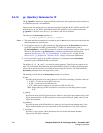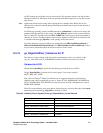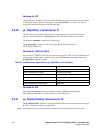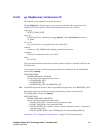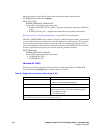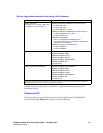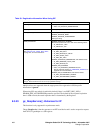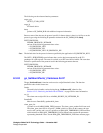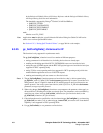
478 Dialogic
®
Global Call IP Technology Guide — November 2007
Dialogic Corporation
Variance for SIP
This function does not apply to SIP call transfer. The SIP stack does not contact the Transfer Target
or Transferred-To party (party C) until party A calls gc_InvokeXfer( ), so there is no issue of
accepting or rejecting the transfer at the initiation stage.
8.3.20 gc_RejectXfer( ) Variances for IP
This function is only available if the call transfer supplementary service was enabled via the
sup_serv_mask field in the IP_VIRTBOARD structure when the board device was started.
The parameter parmblkp is ignored for IP technology.
The gc_RejectXfer( ) function can be used at party B only after the receipt of a
GCEV_REQ_XFER event.
Variance for H.323 (H.450.2)
All six Dialogic
®
Global Call API rejection reasons are supported. Table 37 lists the ctInitiate error
codes that are signaled to party A based on the value of the reason parameter passed when the
gc_RejectXfer( ) function is called.
Variance for SIP
The value of the reason parameter must be between IPEC_SIPReasonStatusMin and
IPEC_SIPReasonStatusMax, as defined in the gcip_defs.h header file.
8.3.21 gc_ReleaseCallEx( ) Variances for IP
The gc_ReleaseCallEx( ) function is supported in both synchronous and asynchronous modes, but
the use of asynchronous mode is recommended.
Note: An existing call on a line device must be released before an incoming call can be processed.
Table 37. ctInitiate Errors Signaled From gc_RejectXfer( ) to the Network
GC Value ctInitiate Error
GCVAL_REJREASON_INSUFFINFO invalidReroutingNumber
GCVAL_REJREASON_INVADDR invalidReroutingNumber
GCVAL_REJREASON_NOTALLOWED suppServInteractionNotAllowed
GCVAL_REJREASON_NOTSUBSCRIBED suppServInteractionNotAllowed
GCVAL_REJREASON_UNAVAIL notAvailable
GCVAL_REJREASON_UNSPECIFIED unspecified









